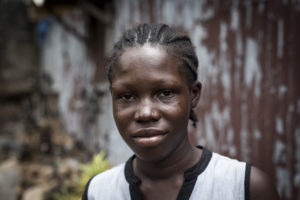Advancing Girls Health Rights and Gender Equality in Sierra Leone
Every seven seconds, somewhere in the world, a girl under the age of 15 is married. Just when they should be looking ahead to a future full of hope, their opportunities are cut short. They can be isolated. Prevented from going to school, seeing their family or accessing healthcare. They are often prevented from working outside of the home, which results in not having their own income and little decision-making power regarding the resources in their household.
That’s pretty shocking. Girls at this age are not ready to be married – not physically or emotionally. Early pregnancy and childbirth can impact their young bodies, leading to dangerous complications or even death. According to the World Health Organization complications during pregnancy and childbirth are the leading cause of death for 15–19-year-old girls globally.
These marriages are a form of sexual and gender-based violence. They infringe girls’ human rights and undermine their chance to fulfil their potential and contribute fully to their communities.
One country where child marriage is rife is Sierra Leone, where 39% of young women were married before their 18th birthday. Meaningful and long-lasting action is needed if gender inequality and discriminatory norms there are to be broken.

So I’m very proud that Save the Children is launching a four-year program called Adolescent Sexual and Reproductive Health in sub-Saharan Africa. It will initially target Sierra Leone, working there to prevent child and forced marriages and transform harmful gender norms, practices, and attitudes.
This has been made possible by a generous grant of $1 million from The Slaight Family Foundation, which has a mission to promote women’s and girls’ rights in impoverished, fragile and developing countries.
Save the Children’s program will benefit at least 37,000 girls, women and boys. To do this, we must address the diverse causes and underlying attitudes that perpetuate gender inequality – and not just from adult males. Gender bias is often echoed and reinforced by women, boys and even girls themselves through socialization.
Helping adolescent girls to make their own decisions about marriage and pregnancy won’t happen overnight. We have to change the deeply-entrenched norms that lead to gender inequality and early and forced marriages.
At the same time, we must also ensure that alternative opportunities – such as quality education – are more accessible for girls. Our program will reach out to girls aged from 10 to 18. It will establish safe spaces with trained facilitators for adolescents to attend classes on health and life skills. It will also implement curriculum on gender inequality and power dynamics.
For me, the new program feels particularly relevant this week as we look forward to celebrating International Women’s Day on March 8. The theme this year is “I am Generation Equality: Realizing Women’s Rights”.
To end gender inequality – and in particular the scourge of child, early and forced marriage – we must put the power into the hands of girls. We must help them to understand and exercise their equal human rights, realize their potential and make their own informed decisions about their own bodies and their own futures.
By Bill Chambers, President and CEO, Save the Children


